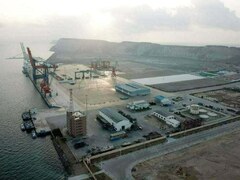DUBAI: The International Monetary Fund said on Thursday Middle East economies would grow at a slower pace this year than it previously projected as the war in Gaza, attacks on Red Sea shipping and lower oil output add to existing challenges of high debt and borrowing costs.
The IMF revised down its 2024 growth forecast for the Middle East and North Africa (MENA) region to 2.7% from 3.4% in its October regional outlook. That would be an improvement from 1.9% growth in 2023.
The downward revision was driven by conflicts in Sudan, the West Bank and Gaza, as well as oil production cuts by Gulf countries weighing on activity.
“Assuming these factors ease in 2025, growth is forecast to strengthen to 4.2%,” the IMF said.
“Uncertainty is high and medium-term growth is forecast to remain below pre-pandemic historical averages.”
Dubai’s economy shows no signs of slowing even as world ‘contends with uncertainty, subdued growth’
Within MENA, oil exporters are seen faring better, with the IMF projecting 2.9% growth this year, up 1 percentage point from last year.
“The voluntary oil production cuts - most notably by Saudi Arabia - are expected to continue to put a temporary damper on growth this year,” the IMF said, adding that “higher-than-projected oil production will boost growth” for other, non-Gulf hydrocarbon producers.
OPEC+ members, led by Saudi Arabia and Russia, last month agreed to extend voluntary output cuts of 2.2 million barrels per day (bpd) until the end of June to support the market. That has helped keep oil prices elevated.
A meeting of top OPEC+ ministers earlier this month kept oil supply policy unchanged. The bloc groups the de facto Saudi-led Organization of the Petroleum Exporting Countries and allies led by Russia.
Gulf economies are seen growing 2.4% this year, a downward revision of 1.3 percentage points from October, the IMF said. Non-hydrocarbon growth in the oil-rich region will be the main driver of growth going forward and ambitious plans to diversify their economies are expected to reduce dependence on hydrocarbons, the IMF said.
Tourism sector vital pillar of Dubai’s economy: Crown Prince
Saudi Arabia is projected to grow 2.6% this year, a downward revision from 4% forecast in October, according to the IMF. The Middle East’s largest economy needs oil at $96.2 to balance its 2024 budget, up from $79.7 the IMF forecast it would need six months ago.
Non-Gulf oil exporters are seen growing 3.3% in 2024, up from 3% seen in October.
Prolonged disruptions to trade in the Red Sea would further impact trade volumes and shipping costs, with a particular impact on Egypt due to lower Suez Canal receipts.
“The conflict in Gaza and Israel is a key downside risk for the MENA region, particularly the risk of further escalation or a protracted conflict and disruptions to trade and shipping,” the IMF said.






















Comments